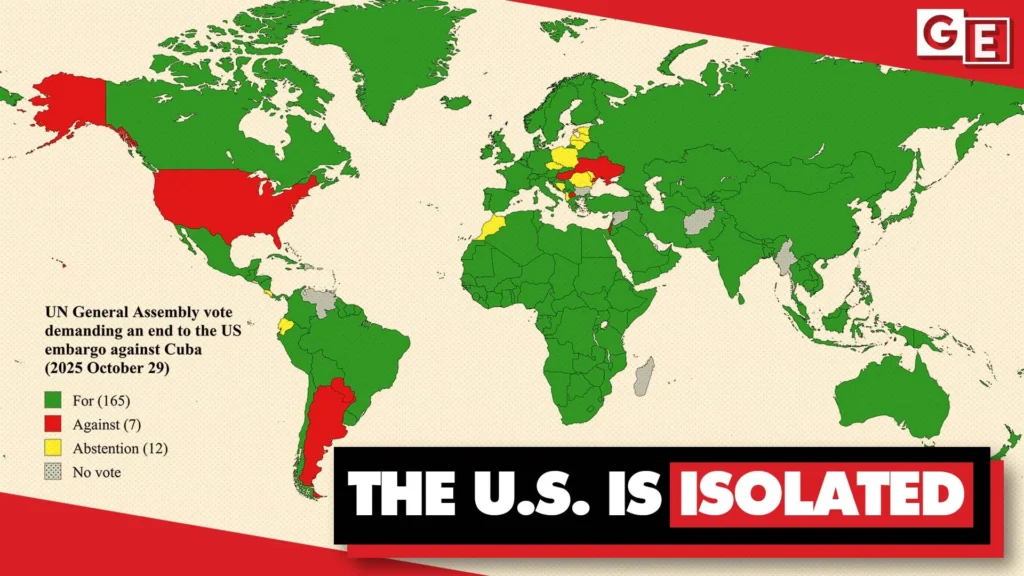USA Isolated: Pressure on Countries to Support Illegal Blockade of Cuba Fails at UN
LATIN AMERICA AND THE CARIBBEAN, 10 Nov 2025
Ben Norton | Geopolitical Economy Report – TRANSCEND Media Service
The Trump admin pressured countries to oppose a UN General Assembly resolution calling to end the illegal US embargo against Cuba. Only 7 voted against it. 165 member states (85%) supported the measure.
3 Nov 2025 – A study by the firm Reputation Lab polled people in 60 major countries, and found that the United States has a very bad reputation. The US ranking fell from what was already a low rank of 30 out of 60 in 2024 to an even worse 48th place in 2025.
A clear demonstration of the political isolation of the US government can be seen in votes at the United Nations.
The vast majority of countries on Earth voted at the UN General Assembly on 29 October to demand an end to the illegal US blockade of Cuba, which has been maintained in blatant violation of international law for more than six decades.
165 countries, representing 85.5% of the UN’s 193 member states, voted in support of a resolution that emphasized the “necessity of ending the economic, commercial and financial embargo imposed by the United States of America against Cuba”.
Just seven nations, or 3.6% of the total, opposed the measure. These included the US and Israel — which vote against the resolution every single year — as well as Argentina, Hungary, Paraguay, North Macedonia, and Ukraine.
Another 12 countries, or 6.2% of UN member states, abstained. These were Albania, Bosnia and Herzegovina, Costa Rica, Czechia, Ecuador, Estonia, Latvia, Lithuania, Moldova, Morocco, Poland, and Romania.

The vote would have been 166 in favor, given that Venezuela expressed strong support for the resolution. However, the South American nation lost its voting rights, because it has not been able to pay the fees it owes to the UN, due to illegal, unilateral US sanctions and an embargo that have prevented Venezuela from accessing its foreign reserves and blocked it from the US-dominated financial system.
The UN General Assembly has held a vote on a similar resolution practically every year since 1992. Nearly all countries on Earth usually support the measure.
The United States has ignored these overwhelming UN votes for more than three decades.
In 2024, support for the resolution was even more overwhelming, with 187 votes in favor, and just two against (the US and Israel), with one abstention (Moldova).

Trump administration fails to pressure most countries to support the blockade of Cuba
Although it seems like the US got a few more countries to join it in voting against the resolution in 2025, this was in fact a big diplomatic loss for the Trump administration, symbolically showing how isolated the United States is on the global stage.
The Trump administration put a lot of energy and resources into pressuring countries around the world to vote against the resolution.
Reuters reported that the State Department, under the leadership of neoconservative war hawk Marco Rubio, ordered US diplomats in dozens of foreign countries to try to force their host nations to follow Washington at the UN.
This effort ultimately failed. Just six countries went along with the Trump administration.
As Reuters put it, “US fails to make big dent in UN vote calling for end to Cuba embargo”.

This issue is a particular obsession of Marco Rubio, the second-most powerful person in the US government, who is simultaneously serving as both secretary of state and national security advisor.
Rubio’s parents were immigrants from Cuba, although he has repeatedly lied about their life story. Rubio long claimed that his parents fled communism. That is not true. They actually moved to the United States in 1956, years before the victory of the socialist revolution in 1959.
Bloomberg noted, “President Donald Trump’s administration mobilized US diplomats this year to push hard against the symbolic vote decrying the trade embargo”.
The US government did have some success in convincing several Eastern and Central European countries to abstain in the vote, in protest of Cuba’s alliance with Russia. Representatives of these governments falsely accused Cuba of sending troops to fight in Ukraine. This is not true. There are reportedly Cuban volunteers who have joined Russian forces in the proxy war against US/NATO-backed Ukrainian forces, but they were not sent by the Cuban government; they went of their own accord, seeking an opportunity to fight against the US empire that has long oppressed them.
Goal of US embargo against Cuba: “hunger, desperation, and overthrow of government”
The United States has waged a brutal economic war against Cuba for roughly 65 years.
The Associated Press noted that, “Of Cuba’s nearly 10 million residents, 80% have spent their entire lives under sanctions, which increased significantly during Trump’s first term, continued under his successor, President Joe Biden, and were tightened again after Trump returned to office this year”.
Less than two weeks after Trump returned to office as US president in January 2025, Marco Rubio published a press release announcing that he was “restoring a tough U.S.-Cuba policy”, by further tightening the suffocating blockade.
In June, Trump signed an executive order boasting of increasing harsh US punitive measures aimed at destabilizing what he called Cuba’s “Communist regime”.
US government officials have admitted that the goal of the US sanctions and embargo is “to weaken the economic life of Cuba” and “to bring about hunger, desperation and overthrow of government”, through “economic dissatisfaction and hardship”.
In a 1960 State Department cable published by the Office of the Historian, the US deputy assistant secretary of state for inter-American affairs, Lester D. Mallory, wrote the following (emphasis added):
The majority of Cubans support Castro.
…
There is no effective political opposition.
…
The only foreseeable means of alienating internal support is through disenchantment and disaffection based on economic dissatisfaction and hardship.
…
every possible means should be undertaken promptly to weaken the economic life of Cuba. If such a policy is adopted, it should be the result of a positive decision which would call forth a line of action which, while as adroit and inconspicuous as possible, makes the greatest inroads in denying money and supplies to Cuba, to decrease monetary and real wages, to bring about hunger, desperation and overthrow of government.

CIA terrorist war on Cuba
In addition to the economic war, the United States has waged a terrorist war against Cuba for decades.
The CIA and other US agencies tried to assassinate Cuba’s revolutionary leader Fidel Castro at least 638 times, according to official documents.
In 1961, the CIA launched a failed assault on Cuba, known as the Bay of Pigs invasion.
The US also planned to use terrorist tactics to violently overthrow Cuba’s government, in a shadowy scheme called Operation Northwoods.
In a 2001 report titled “U.S. Military Wanted to Provoke War With Cuba”, ABC News reported the following (emphasis added):
In the early 1960s, America’s top military leaders reportedly drafted plans to kill innocent people and commit acts of terrorism in U.S. cities to create public support for a war against Cuba.
Code named Operation Northwoods, the plans reportedly included the possible assassination of Cuban émigrés, sinking boats of Cuban refugees on the high seas, hijacking planes, blowing up a U.S. ship, and even orchestrating violent terrorism in U.S. cities.
The plans were developed as ways to trick the American public and the international community into supporting a war to oust Cuba’s then new leader, communist Fidel Castro.
America’s top military brass even contemplated causing U.S. military casualties, writing: “We could blow up a U.S. ship in Guantanamo Bay and blame Cuba,” and, “casualty lists in U.S. newspapers would cause a helpful wave of national indignation.”

_____________________________________
 Benjamin Norton is an investigative journalist, analyst, writer and filmmaker. He is the founder and editor of Multipolarista and is based in Latin America. His website: BenNorton.com (Publicaciones en español aquí.)
Benjamin Norton is an investigative journalist, analyst, writer and filmmaker. He is the founder and editor of Multipolarista and is based in Latin America. His website: BenNorton.com (Publicaciones en español aquí.)
Go to Original – geopoliticaleconomy.com
Tags: Anglo America, Anti-hegemony, Anti-imperialism, Cuba, Embargo, Fidel Castro, Latin America Caribbean, UNGA, USA, United Nations
DISCLAIMER: The statements, views and opinions expressed in pieces republished here are solely those of the authors and do not necessarily represent those of TMS. In accordance with title 17 U.S.C. section 107, this material is distributed without profit to those who have expressed a prior interest in receiving the included information for research and educational purposes. TMS has no affiliation whatsoever with the originator of this article nor is TMS endorsed or sponsored by the originator. “GO TO ORIGINAL” links are provided as a convenience to our readers and allow for verification of authenticity. However, as originating pages are often updated by their originating host sites, the versions posted may not match the versions our readers view when clicking the “GO TO ORIGINAL” links. This site contains copyrighted material the use of which has not always been specifically authorized by the copyright owner. We are making such material available in our efforts to advance understanding of environmental, political, human rights, economic, democracy, scientific, and social justice issues, etc. We believe this constitutes a ‘fair use’ of any such copyrighted material as provided for in section 107 of the US Copyright Law. In accordance with Title 17 U.S.C. Section 107, the material on this site is distributed without profit to those who have expressed a prior interest in receiving the included information for research and educational purposes. For more information go to: http://www.law.cornell.edu/uscode/17/107.shtml. If you wish to use copyrighted material from this site for purposes of your own that go beyond ‘fair use’, you must obtain permission from the copyright owner.
Join the discussion!
We welcome debate and dissent, but personal — ad hominem — attacks (on authors, other users or any individual), abuse and defamatory language will not be tolerated. Nor will we tolerate attempts to deliberately disrupt discussions. We aim to maintain an inviting space to focus on intelligent interactions and debates.
Read more
Click here to go to the current weekly digest or pick another article:
LATIN AMERICA AND THE CARIBBEAN:
